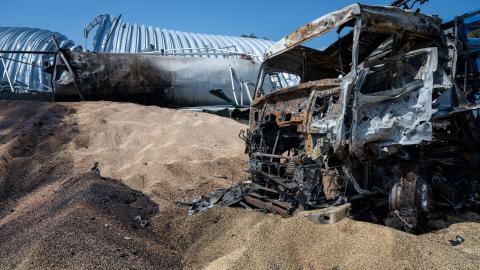One of the many unintended consequences of Russia’s action in Ukraine last year has been the conflict’s impact on the security and stability of global food supplies.
Before the invasion, Ukraine was the world’s largest exporter of sunflower oil, the fourth-largest exporter of corn, and the fifth-largest exporter of wheat. When the fighting broke out in February 2022, the future of Ukraine’s agricultural exports was placed in doubt. However, a Turkish-led diplomatic effort brokered the Black Sea Grain Initiative between Russia and Ukraine last summer. The deal, overseen by the UN Joint Coordination Center, allowed Ukrainian agricultural products to be exported to the world.
From the very beginning of the grain deal last year, there was a concern it would not last long. Less than 24 hours after signing the agreement in July 2022, Russia launched a cruise missile attack on the port at Odesa — one of the locations identified in the agreement as being allowed to ship Ukrainian grain. Even so, the deal finally got off the ground, and fears of a global food crisis were averted — at least temporarily.
However, earlier this month, Russia announced it was no longer participating in the initiative. This announcement was followed by a statement from the Russian Ministry of Defense, warning that “all vessels sailing in the waters of the Black Sea to Ukrainian ports will be regarded as potential carriers of military cargo,” and adding that countries operating such vessels will be considered to be involved in the conflict on the side of Ukraine. This has placed the global food supply in a precarious situation.
Since leaving the agreement, Russia has launched a series of targeted airstrikes against facilities involved in exporting Ukraine’s agricultural products to global markets. Photos and videos on social media show the destruction of grain storage sites in Ukrainian ports. So far, these attacks have destroyed more than 60,000 tons of grain. In the words of Barbara Woodward, the UK’s permanent representative to the UN, this “is enough to feed 270,000 people for a year or to double WFP (World Food Programme) shipment to both Sudan and Somalia.”
The Middle East and North Africa region, in particular, is dependent on Ukrainian grain. For example, before the war, 81 percent of Lebanon’s wheat imports came from Ukraine. For Qatar, the total was 64 percent. About half of Tunisian and Libyan wheat imports came from Ukraine, as did just over a quarter of Egypt’s.
Unsurprisingly, the issue of Ukrainian grain exports became a topic of discussion at the Russia-Africa summit in St. Petersburg last week. Speaking to the media, Comoros President Azali Assoumani, who currently oversees the 55-nation African Union, said: “We will discuss it (the grain deal) with Putin to see how we can restart this agreement.”
The impact of the agreement ending is also felt outside the region. China is the single largest beneficiary from the grain deal, having imported 8 million tons of agricultural products from Ukraine since the agreement went into force last summer. Bangladesh has also benefited significantly from the initiative. According to the UN, 57 percent of agricultural items exported from Ukraine over the past year went to developing countries. Since the grain initiative was launched last July, Ukraine has also supplied the WFP with 80 percent of all its grain. By comparison, before the war, it provided only half. This is now all in jeopardy.
The timing of Russia’s withdrawal from the grain deal is also bad news for Ukrainian farmers. Ukraine’s agriculture sector depends on grain storage facilities being emptied in order to receive new inventory by harvest time each autumn. If Ukraine is unable to shift its exports currently in storage, not only will the agricultural products rot and become useless, but there will also be nowhere to store this year’s harvest, now only a few months away.
Exacerbating the global food security problem is the intense heat threatening much of the northern hemisphere this summer. The last major heat wave in Europe in 2018 led to a 50 percent drop in crop yields in central and northern Europe. With this summer already one of the hottest on record, it remains to be seen how the agriculture sector, as well as global markets, will be affected.
In the past 50 years, there have been numerous occasions when a surge in food prices led to instability, rioting and revolution in the MENA region. Before the recent suspension of the grain deal, the WFP estimated that 349 million people are now in a state of “acute hunger.” This is a new record. With the removal of Ukrainian agricultural products from international markets, there is a genuine threat of even more hunger and instability. This is the last thing the MENA region, or indeed the world, needs.
Some have called on NATO to assemble a coalition to escort Ukrainian grain ships out of the Black Sea, but this seems unlikely to happen. With Russia threatening to attack any vessel arriving into Ukrainian ports, insurance companies will be reluctant to extend coverage for cargo ships. All eyes are on Turkiye to see if it can get the original deal back on track, but so far, no obvious progress has been made.
The most effective and realistic way to get the grain deal back is for the leaders of countries most affected to pressure the Kremlin before it is too late.



















